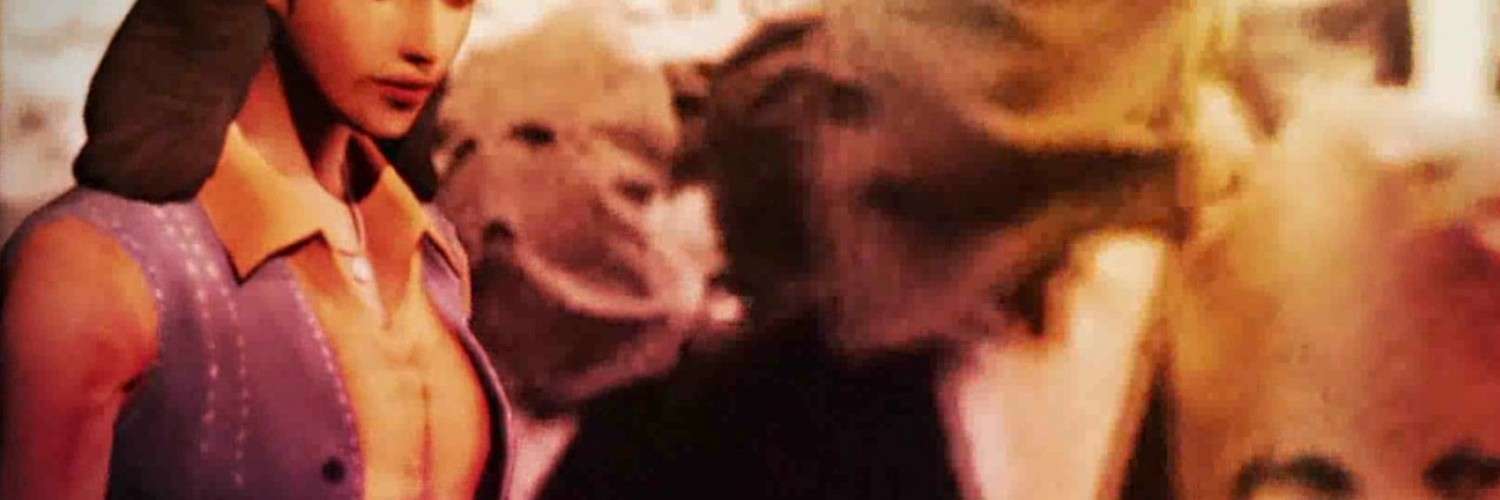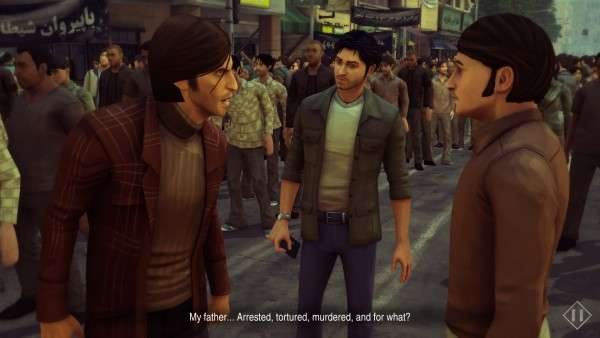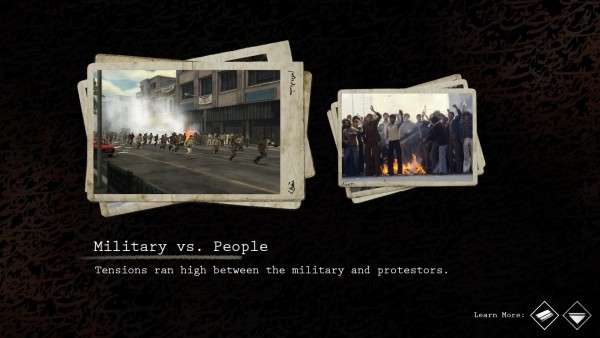
1979 Revolution: Black Friday PC Review
1979 Revolution: Black Friday is a game filled with anxiety driven decision and butting heads, but the most memorable part is sitting down and watching a family’s home videos. After being taken home by the main character’s brother, Hussein, and fighting over dinner, Reza goes into his father’s office to look for a camera only to find a stack of film reels. They sit on the desk, representing the past where both of the brothers got along and the family was not worried about the future of the Iranian people. Reza adds a loving comment about how he has to watch his Baba’s home movies, and the player is free to pick from the stack and watch any of the films. This shows how much Reza loves his family and friends, but it also conveys to the player that these characters contain lives, love and a culture as much as any us do.

Contemporary games have the ability to tell stories about experiences and people that audiences may never understand through their own personal lives. This is clearly a large part of games that are releasing now with visual novels surging on Steam and games such as Firewatch and Gone Home becoming largely popular releases. We are beginning to embrace the idea that these stories can be told and we can learn about new cultures and ideals. However, games have barely scratched the surface of relaying international culture to audiences without glorification or stereotyping. For example, mexican culture is used as a style and theme in games like Grim Fandango and Guacamelee. While they may look nice and create intrigue surrounding the culture they are only using these to create a theme benefitting the game. I do not mean to say that these games are inherently wrong for creating something that is inspired by other cultures, but the problem lies in the fact that they are the only works being made about other cultures.
1979 Revolution: Black Friday is different from these games because it is a game telling a story that deeply cares about the culture that it is born from. The story follows a photographer named Reza Shirazi who is deciding whether or not he is going to take the risk of participating in the revolution or not. One of the primary mechanics in the game is taking photos of the revolution in order to document what is happening. There are people in the street burning government property to create disorder and tension, activist figures with megaphones stand on overturned vehicles and platforms spreading word of change and peace. There are also barbari bread salesmen in the street, that are not related to the revolution at all but simply a way of Iranian culture that exists in day to day living. These warm touches of love for the culture is what makes 1979 so enticing.

The game follows the style of many modern adventure titles, similar to games like Read Only Memories and The Walking Dead. The game starts and the first thing that shows on screen is, “Your choice will influence the outcome of the revolution”. Yup, we have definitely heard that before, it is clear that they want the player to feel agency. I wouldn’t say that it necessarily works though. There are many decisions in 1979 that feel like they don’t matter at all, and most of the time this is only weakened by the narrative structure, which is jumping between an interrogation scene and flashbacks. Many times a decision would come up and I would not have enough information or time with characters to really care about what I was doing.
This is not the only problem that I have with the decisions either, similar to The Walking Dead the player must make decisions based on a timer and sometimes it is going so fast that it is hard to even think about each decision. A majority of the time, even if it was a decision I made then Reza would only end up saying something completely different than what I thought a decision meant. The other thing about the decisions in the game is that they are very clear black and white choices that must be made. You either throw a rock at the military or you don’t, and if you are a player who sticks to a consistent character there is no reason to actually balance out the decisions. I am happy that there are decisions for the player to make, but it is clear that the player is only along for the ride with little say in the matter.
While I am on the topic of my problems with the game I must mention that the performance in this game is not good. I have hardware that is way above the specifications required for this game, yet every time I was set in a scene filled with crowds of people I was playing at around 10-15 FPS. So for a game about a revolution that is almost entirely filled with crowds of people it was pretty rough a lot of the time. It did not effect a majority of the gameplay but there are action moments in the game, also similar to The Walking Dead, where the player must dodge and mash buttons in order to live. I actually failed two or three of these due to these framerate drops which was slightly frustrating.

I do not think that this game’s flaws outweigh what it is trying to achieve after finishing it though. If other games had these problems then it may be a different case, but what 1979 aims for is so unique and refreshing that they are hardly memorable once everything is completed. 1979 Revolution: Black Friday is a game for those interested in history being depicted in an interactive format and it succeeds in providing that information but it also succeeds in providing a look into another person’s culture. There is not many games that attempt to do this and do it with the touches of compassion that are clear in the game.
